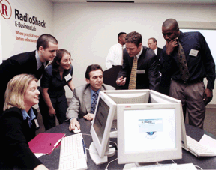Ease of business
The Neeley School — with corporate partners RadioShack, Microsoft and Compaq — opens a lab where its E-Business students can become “virtual architects” for the e-commerce ahead.
Ease of business
The Neeley School — with corporate partners RadioShack, Microsoft and Compaq — opens a lab where its E-Business students can become “virtual architects” for the e-commerce ahead.
 |
| Computer shack. RadioShack CEO Len Roberts tests out one of the computer-in-the-round workstations, part of the new RadioShack E-Business Laboratory, with business students Brooke Sawyers, Matthew White, Karen Schaefer, Michael Hockridge and Yushau Sodiq. |
Radio Shack CEO and Chair Len Roberts said with a grin in February that only he could take liberties with his Fortune 500 company’s brand, but in dedicating the University’s newest and most advanced computer lab, he told the students in attendance who would use the digital think space: “You’ve got questions, this RadioShack E-Business Laboratory has answers.”
Minutes later, Roberts — joined by Microsoft and Compaq partners who donated hardware and software — cut via computer a virtual purple ribbon to officially open the design and development lab. Outfitted with sleek flat-panel monitors situated in pods of four, the lab will serve 135 students currently pursuing the E-Business degree, established at TCU two years ago, the first undergraduate degree of its kind at an AACSB-accredited university.
To complete the 27-hour technical layer of their degree, students will study, build and produce corporate web pages and databases, and use Microsoft and Oracle tools to develop the information and tracking systems many companies use to stay connected to their customers and clients.
“There is a real need for employees who possess these types of skills as technology continues to permeate the way we do business,” Roberts said. “TCU’s program will ensure that the wonders of the digital world are captured and put to work to improve business processes for corporations nationwide and throughout the world.”
Each lab will consist of up to 40 students working in teams. Professors use the lab’s two laser-sensitive “smart boards” to write and project lessons, to pull up websites, even to project any student’s computer desktop, all with a simple hand motion. Lab classes dissect Web sites using the boards, looking for soundness of design and overall fit to a company’s goals.
TCU’s first batch of E-Business students graduate next summer. When finished, they will be able to develop complex information systems using extranets, intranets and the Internet, harnessing numerous computer languages, databases and applications.
“Students with these types of skills will have wide latitude in their careers,” said M. J. Neeley School of Business Dean Robert Lusch. “They will be invaluable to businesses who aggressively seek ways to integrate technological solutions into their systems so they can effectively be connected internally and externally to consumers and other businesses.”

Your comments are welcome
Comments
Related Reading:
Campus News: Alma Matters
TCU’s Library Celebrates a Century
Uncover hidden gems of the academic hub, from vintage mechanics to modern masterpieces.
Campus News: Alma Matters
Infographic: TCU’s Shared Values
The Board of Trustees adopted four TCU values after considering input from more than 4,000 constituents.